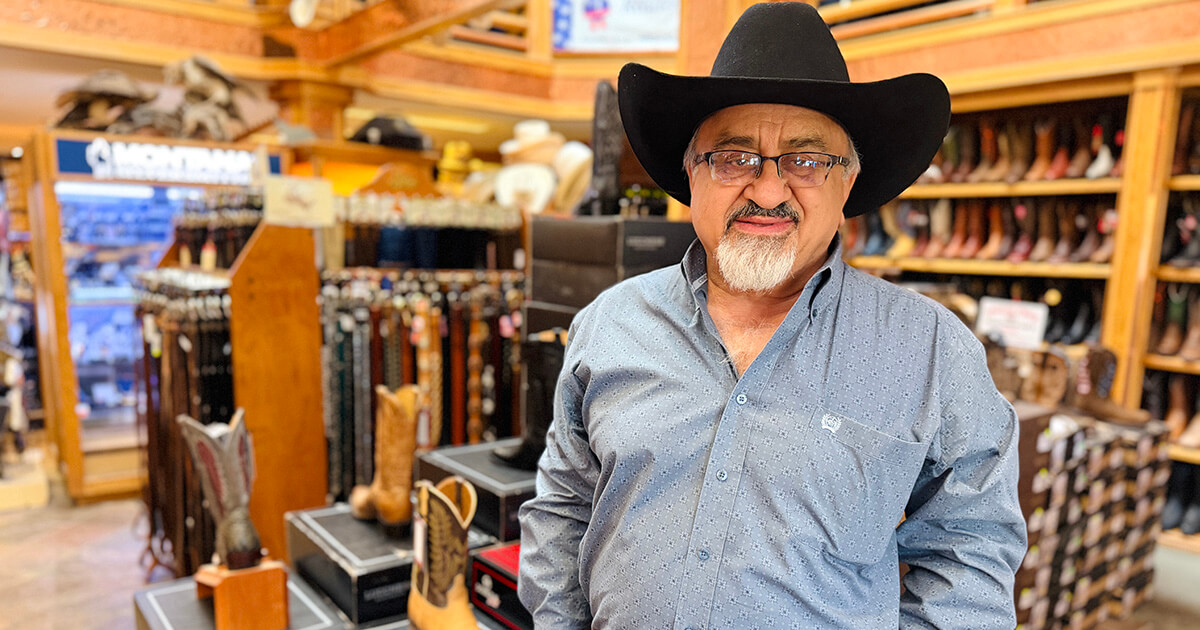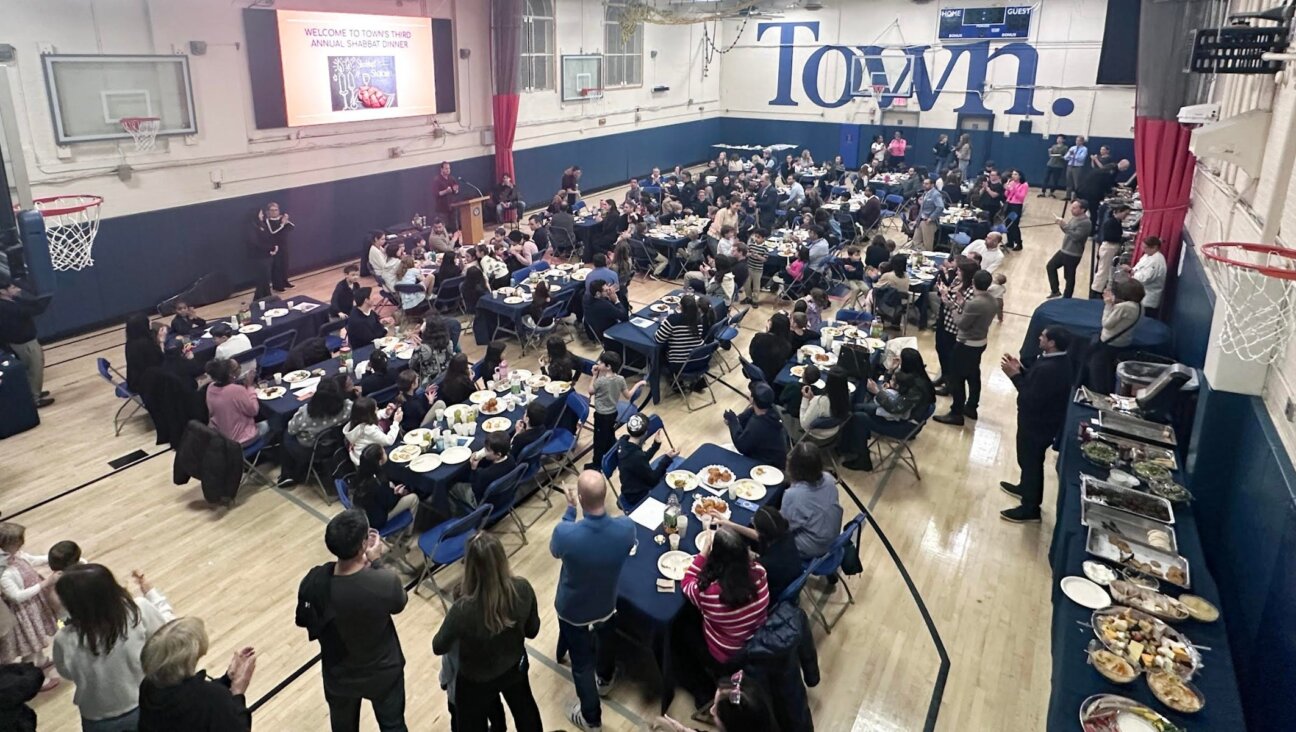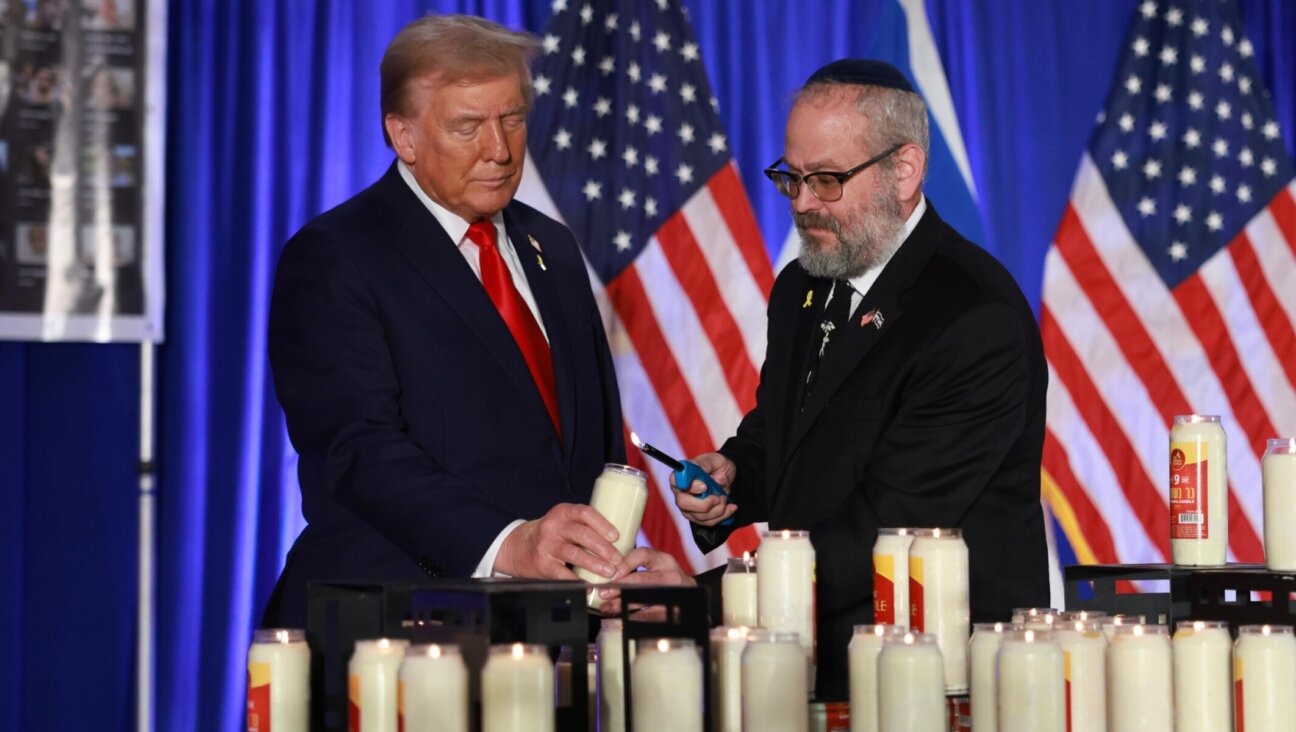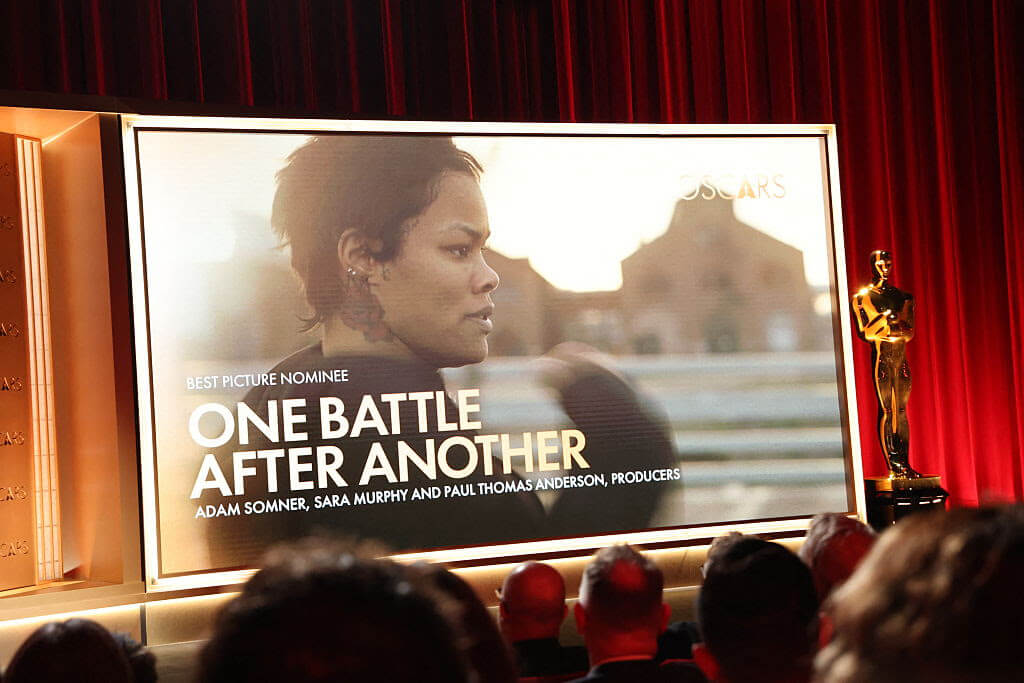White Nationalist Conference Ponders Whether Jews and Nazis Can Get Along
LETTER FROM HERNDON, VA.
For the small, hardy band of right-wing Jews who attended this past weekend’s American Renaissance Conference, the biennial gathering of white nationalists ended on a sour note.
The events Saturday, February 25, passed without major incident. But then, late Sunday morning, none other than former Ku Klux Klan leader David Duke approached the microphone on the floor during the question-and-answer session for French writer Guillaume Faye. After congratulating Faye for stirring remarks that “touched my genes,” Duke asked if there weren’t an even more insidious threat to the West than Islam.
“There is a power in the world that dominates our media, influences our government and that has led to the internal destruction of our will and our spirit,” Duke said.
“Tell us, tell us,” came a call from the back of the room.
“I’m not going to say it,” Duke said to rising laughter.
But Michael Hart, a squat, balding Jewish astrophysicist from Maryland, was not amused. He rose from his seat, strode toward Duke (who loomed over him like an Aryan giant), spit out a curse — “You f…ing Nazi, you’ve disgraced this meeting” — and exited.
As it happens, only a few minutes earlier Hart, a mainstay of American Renaissance conferences, had been trying to reassure Herschel Elias, a first-time attendee from suburban Philadelphia, that he should not let his observation that the meeting was “infiltrated by Nazis and Holocaust deniers” ruin his impression of American Renaissance.
“The speakers aren’t Nazis,” Hart assured him. “Jared isn’t a Nazi.”
Jared is Jared Taylor, editor of American Renaissance magazine. He founded the publication 1990, and since 1994 he had sponsored the biennial conference that bears its name. A former liberal, Taylor is glib, gracious and genial, capable of putting his white nationalism in the most benign and commonsense terms.
“We mean well to all people,” he said in his address at this year’s conference, “but our own people come first.”
The conference has attracted ever larger crowds, with this year’s event drawing about 300 people — all white (no more than 5% Jewish) and most of them male. The attendees are united by a common belief in black intellectual inferiority, opposition to non-white immigration and ardor for maintaining America’s white majority. By the end of this seventh biennial conference, however, the delicate state of his coalition seemed apparent.
Hart, who spoke at the 1996 conference about his plan for a racial partition of the United States, said that Taylor now had to face the fact that he must purge the Nazis or lose the Jews. “He can’t expect Jews to come if there are Nazis here,’’ Hart said.
And therein lies Taylor’s dilemma.
From the start, he has been trying to de-Nazify the movement and draw the white nationalist circle wider to include Jews of European descent. But to many on the far right, taking the Jew-hatred out of white nationalism is like taking the Christ out of Christmas — a sacrilege. Actually inviting Jews into the movement is an act of lunacy, or betrayal, to them.
Still, just before dinner Saturday, Taylor sounded resolute.
“Ultimately, for all the things I care about to happen, Jews must be part of the movement,” he said in an interview. The reason, he added, is that Jews have influence and are widely seen as “the conscience of our society.”
For example, Taylor said, without Jewish support it will be nearly impossible to restrict immigration. Besides, the conference organizer said, as far as he is concerned, a white Jew is white.
In its dossier on Taylor, the Southern Poverty Law Center’s Intelligence Review speculates that his conspicuous lack of antisemitism “may be related to his wife, who some in the movement have said is Jewish.” The Atlanta-based organization, which monitors hate groups, has described Taylor as “the race hater.”
“What kind of ‘intelligence’ is that?” Taylor asked. He said that his wife, Evelyn Rich, is not Jewish.
According to the Intelligence Review: “Evelyn Rich became well known because of her 1985 and 1986 interviews of Duke, conducted as part of her dissertation research… [which] were used by anti-Duke forces to make radio ads attacking Duke during his run for Louisiana governor in 1991.” This may help explain the wary relationship between Duke and Taylor, opposites in many ways.
In May 2003, American Renaissance published a piece by Michael Berman about his racial awakening, headlined “I Was a Red-diaper Baby.”
Son of a card-carrying Communist, Berman marched on Washington with Martin Luther King Jr. But, he wrote, that was before two of his sisters were raped by black men and before he served eight years as the dean of boys at Brooklyn’s George W. Wingate High School, where “we averaged five arrests a day.” These days he attends American Renaissance conferences, and this year he brought a likeminded former teaching colleague to serve as his shabbos goy.
“It has not been easy for me as a New York Jew, embracing the views that I do. I am regarded as a pariah,” Berman wrote in his 2003 essay.
Four of the 10 speakers were Jewish at the first conference in 1994 in Atlanta, including New York writer Lawrence Auster and City College philosophy professor Michael Levin. The after-dinner speaker that year was Rabbi Mayer Schiller, a teacher at Yeshiva University High School for Boys who believes in racial separatism. Schiller brought a cadre of yeshiva students with him. Kosher dinners were provided.
At the 2000 conference in Herndon, Robert Weissberg — a political scientist who then worked at the University of Illinois — delivered a speech titled “Jews and Blacks: Everything the Goyim Want To Know but Were Afraid To Ask.” His thesis was that although Jews and blacks loathe one another, Jews remain frightened of the white right.
Weissberg delivered his remarks with his trademark blend of erudition, Yiddishisms and Borscht Belt timing. He was not a big hit. Taylor heard the complaints: “Now the Jews want to take over this, too.”
Weissberg, who is living in New York once again, keeps coming to the conferences. He enjoys the open talk about race, perhaps also the whiff of intellectual danger. At the Saturday morning session, the man sitting next to him doodled on his pad: “No good Jew.”
Despite such sentiments, Taylor is not the only one looking to include Jews.
Gordon Baum, the amiable, chain-smoking CEO of the Council of Conservative Citizens, said that his organization has good Jewish members, including a member of the board from St. Louis. “We’re in Mensa together,” Baum said. He also said that obsessing over Jews “sidetracks you from the real issue.”
But Louis Calabro, a retired San Francisco police officer who heads the European/American Issues Forum in the Bay Area, said his sense is that most of those at the conference consider Jews a problem. He revealed that, in his own experience, any time he does anything to rally white European American pride, those who object are almost invariably Jews.
There is also the question of whether any subordination of antisemitism is merely strategic.
Nick Griffin has been credited with trying to root out antisemitism from the British National Party, which he leads. But in answer to a question at the recent conference, he said: “The proper enemy to any political movement isn’t necessarily the most evil and the worst. The proper enemy is the one we can most easily defeat.’’
Faye, the French writer, offered a similar response to Duke’s not-so-veiled reference to Jews.
“The danger of the Jews is not the same as danger of the Arabs,’’ he said. He continued: “The Jew is” — and here he had to have Taylor interpret a French expression — “the hole in the dike.”
“The water is immigration,” he continued. “We must fight on two fronts, but not by the same means. We must be very acute in our strategy. The best thing is to not speak about the Jews. They don’t exist. For me, they are like Eskimos.”
Not everyone at last weekend’s meeting could stay cool on the Jewish question. Before Faye spoke, Michael Matthews, an attendee from New Jersey, passed Michael Berman in the hotel foyer.
“Are you a Jew?” Matthews demanded. “I don’t think you should be here.”
Berman was hurt.
“You see, there’s no home for me,’’ he sighed after Matthews had left. “I’m like a black sheep here and everywhere I go.”
















